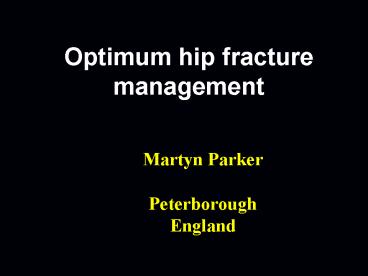Martyn Parker Peterborough England
1 / 35
Title:
Martyn Parker Peterborough England
Description:
Spinal anaesthesia. Avoid over transfusion (post-op hb 9g/100ml) ALSO ONE OR MORE OF ... MJ, Handoll HHG, Griffiths R. Anaesthesia for hip fracture surgery in ... –
Number of Views:56
Avg rating:3.0/5.0
Title: Martyn Parker Peterborough England
1
Martyn ParkerPeterboroughEngland
Optimum hip fracture management
2
The answer
- The treatment of a hip fracture is early
effective surgery with discharge home as soon as
practical
3
Key reference
- Sign guideline number 56
- Prevention and management of hip fracture in
older people - www.sign.ac.uk
- An evidence based guideline of key aspects of
care
4
Randomised trials of hip fracture management
- Cochrane review on hip fractures
- www.Cochrane.Org
- Summarises all randomised trials on hip fracture
care
5
A E MANAGEMENT
- Analgesia
- Assessment, bloods, ECG
- Intravenous fluids
- Avoids excessive delays
6
Pre-operative care
- Resuscitation and fluid balance
- Thromboembolic prophylaxis (heparin,
aspirin, mechanical) - Analgesia
- Minimise delays to theatre
- Pressure area care
- Planning for discharge
7
Thromboembolic prophylaxis
- Early surgery
- Early mobilisation
- Spinal anaesthesia
- Avoid over transfusion (post-op hb
9g/100ml) - ALSO ONE OR MORE OF
- Low molecular weight heparin or aspirin
- (foot pumps)
- (Compression stockings)
The lack of a good evidence base means there can
be no firms recommendations
8
Timing of surgery
- Surgery should be as soon as possible after
admission - Delays of more than 48 hours from admission will
increase morbidity (pressure sores,
thromboembolic, pneumonia, UTI) - For every 8 hours of delay results in an
increased of hospital stay of 1 day
Siegmeth AW, Gurusamy K, Parker MJ. Delay to
surgery prolongs hospital stay in patients with
fracture of the proximal femur. J Bone Joint Surg
200587-B1123-1126.
9
Acceptable reasons for delaying surgery
- Anaemia (Haemoglobin lt about 90g/l)
- Dehydration or acute uraemia
- Severe electrolyte imbalance (Na lt 120 or gt
150 K lt 2.8 or gt 6.0 mmol/l) - Uncontrolled diabetes
- Uncontrolled heart failure
- Correctable cardiac arrhythmia
- ? Acute chest infection or exacerbation of
chronic chest
10
Unacceptable reasons for delaying surgery (gt24
hours from admission)
- Medical assessment
- Unnecessary investigations
- Minor electrolyte abnormalities
- Warfarin with high INR
- Aspirin, clopidogrel
- Lack of consent
- Lack facilities
11
Warfarin with high INR
- Acute trauma causes a rise in the INR
- The INR may take days to fall in the elderly
- All hospitals should have a policy on emergency
surgery and warfarin, this involves the use of
low dose vitamin K, fresh frozen plasma or
coagulation factors
12
Clopidogrel
- Some centres delay surgery for 7 days
- The adverse consequences of delaying surgery are
likely to be more than the potential
complications of bleeding
13
Unnecessary investigations
- For example, delaying a patient whilst waiting
for an echocardiogram probably carries more risk
than any possible benefit
14
Anaesthesia
- Spinal anaesthesia slightly better than general
anaesthesia - Experienced anaesthetist
Parker MJ, Handoll HHG, Griffiths R. Anaesthesia
for hip fracture surgery in adults (Cochrane
Review). In The Cochrane Library, Issue 4, 2001.
Oxford Update Software.
15
Surgery
- Must be performed by experienced staff
- Minimally invasive
- Technically correct to allow unrestricted
mobilising
16
Unacceptable aspects of surgery
- Unsupervised junior staff
- Operations lasting more than one hour
- Poor surgery resulting in complications (cut-out,
sepsis, dislocation)
17
Post-operative care
- Unrestricted mobilisation the day after surgery
18
Post-operative care
- Nutritional supplements
- Often neglected in modern care
Duncan, Beck, Hood, Johansen. Age Ageing 2006
35148-153
19
Rehabilitation different models of care
- Acute orthopaedic ward
- Transfer to geriatric or rehabilitation ward
- Discharge to community rehabilitation homes
- Hip fracture ward
- Early supported discharge at home
20
Optimum method of rehabilitation
- Admission to and discharge from a hip fracture
unit which has medical and surgical care - Early supported discharge of patients wherever
possible - Avoidance of transferring of patients
21
Who should manage hip fracture patients pre and
post-operatively?
- Orthopaedic staff
- Anaesthetists
- Geriatricians
22
- Should these patients be managed by a specialised
physician or geriatrician who requests the help
of the appropriate technical staff ? (surgeon
anaesthetist)
23
Role of specialised physician
- Preparation for theatre
- Post-operative care
- Manage associated medical conditions
- Treat post-operative complications
- Rehabilitation
- Social care assessment
- Fracture prevention
24
Peterborough hip fracture project
25
Peterborough hip fracture project
- Early assessment of patients and treatment plan
- Early effective surgery
- Immediate mobilisation
- Early discharge
26
Operative or conservative
- Currently 98 of patients in Peterborough are
treated surgically
27
(No Transcript)
28
Scottish hip fracture audit - 36 days
Dr Foster, England 26 days
29
(No Transcript)
30
England national average 13
31
Immediate outcome
- 88 discharged back home
- 5 need change of residence
- 7 die in hospital
32
Outcome at one year
- 57 same residential status
- 10 more dependent
- 33 died
33
Patients from own home at one year
- 67 Own home
- 6 Residential home
- 2 Nursing home
- 1 Hospital
- 24 Died
34
Patients from residential or nursing homes
- 1 Own home
- 43 Institution
- 56 Died
35
The future
- Despite preventive measures hip fractures are
with us for the foreseeable future - Will be earlier discharge of patient after less
invasive surgery































